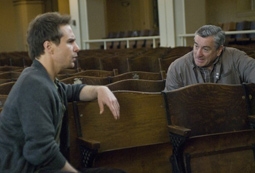





Ignorance can provide a momentary sense of bliss. Yet when hidden truths surface in the film Everybody’s Fine, as they always do, Frank Goode (played by Robert DeNiro) feels a scorching sense of pain and deceit that leads him into cardiac arrest. A film by Kirk Jones, Everybody’s Fine was originally written and directed in Italian by Giuseppe Tornatore in 1990. An emotionally engaging and touching movie, Everybody’s Fine combines poignant moments of sadness with very few scenes of comic relief to produce a heartfelt movie that emphasizes the importance of family and trust.

Frank (Robert DeNiro), a recently widowed father of four, wants nothing more than to bring his family together. A hard-working, overly critical father, Frank allowed his wife to act as the “glue” of the family. After her death, Frank craves the closeness of family and seeks to insert himself into the lives of his children. Dispersed across the country, Rosie (Drew Barrymore), Amy (Kate Beckinsale), and Robert (Sam Rockwell) avoid reunions in an attempt to conceal their own imperfections.

The initial scene illustrates Frank’s solitude; his plants serve as his only companions, and his doctor and supermarket employees give him his daily dose of conversation. Desperate for companionship, Frank prepares an elaborate family dinner, yet one by one, his children leave sympathetic, yet trite messages explaining why they cannot attend the dinner. “My son has a fever,” “I’m too busy with work,” Frank’s answering machine murmurs.

Frank’s children, played by a vibrant Drew Barrymore, a stylish Kate Beckinsale, and a morose Sam Rockwell, once told all their secrets to their mother, who filtered the truth by sharing only good news with her husband.

Everybody’s Fine successfully poses the question, “Why should we share ourselves with other people (even if they are our family), and thus open ourselves up for criticism?” Everybody’s Fine explores the formalities of daily speech such as “How is everybody?” or “Everybody’s fine,” and how they act as barriers to protect us from the judgments and expectations of others. Frank’s children inaccurately assume that their father does not want to know their worries, fears or failures. For this reason they have each created a second, successful identity for themselves to make their father proud.

Rosie (Drew Barrymore), the only upbeat character in Everybody’s Fine, rents an apartment in Las Vegas so her father will think she is living large. Robert (Sam Rockwell) claims he is touring through Europe and has no free time. Amy (Kate Beckinsale) creates the front of having a happy family despite her husband’s duplicity. The more elaborate the artificial web of false truths becomes regarding themselves and their missing brother David, the harder it becomes for Frank’s children to tell him the truth.

A beautiful, yet almost overwhelming sense of sadness pulses through Everybody’s Fine as the viewer witnesses Frank’s escalating expectations of his family, and the consistent disappointments that follow. What makes Frank a remarkable character is that his optimism is never fully crushed; he refuses to give up on his family. In Everybody’s Fine DeNiro boldly balances the sadness Frank feels in his own isolation with a pervasive sense of hope for his family’s future.
When his children fail to attend his family dinner, Frank packs his bags, despite a warning from his doctor, and treks across the country to surprise each one of his children with a visit. Perhaps it is Frank’s persistence that helps him succeed in bringing (almost) everyone around the same table at the end of Everybody’s Fine. “Are you happy?” Frank asks each child. No one appears to be happy because they have become too involved in creating false realities for their father, and for themselves. Though it is hard to say for sure. If Frank pushes too hard it is because he believes in his children with an unnerving fortitude. Frank realizes that his son Robert (Sam Rockwell) became a drummer, and not a conductor as he always wished to be. “You can still be a conductor!” Frank urges. His optimism is too much for Robert who is weary and downtrodden, yet content with mediocrity.
Frank’s strong belief in the good of other people keeps him waiting on a dilapidated apartment stoop in New York City for his son David, the artist, who never appears. Robert DeNiro’s face betrays his character Frank’s disappointment. With a sweet sadness, he places an envelope under the door with hope that his son will receive his warm wishes.
In a painfully touching scene in Everybody’s Fine, Frank waits for a train in a desolate station in Middle America on his journey. His faith in people inspires him to give money to a seedy, homeless drug addict. No good deed ever goes unpunished, and the derelict attacks and robs Frank, crushing his medication into pieces. Robert DeNiro skillfully portrays Frank’s undying spirit and determination to continue his journey as he serenely sweeps the pill fragments into his worn hands.
Ironically, Frank worked in a telecommunications factory lining telephone wires. Though his career involved creating devices to facilitate communication, Frank could never communicate well with his own children. “Put mom on the phone,” the kids always said. The movie interestingly uses the telephone wires as a vehicle for the plot. We learn about David and his disappearance through phone conversations between the siblings from the present and the past.
In an illuminating and almost disturbing scene in Everybody’s Fine, Frank sits at the head of the dining table as Rosie, Amy, David, and Robert, as children, speak from adult perspectives to reveal their secrets which are as shocking and surprising to the viewer as they are to Frank. The attempt to shield Frank from reality only serves to break his heart, literally causing a heart attack.
When does the family finally unite? When Frank lies in a hospital bed. Do only sorrowful occasions bring families together? Thankfully, Everybody’s Fine suggests not. Through perseverance and faith in family lies can be forgiven and forgotten, relationships can be mended and family can become a source of support and love. I would recommend Everybody’s Fine to anyone who needs a sweet, yet somber reminder to call home this holiday season.
Everybody’s Fine
Rated PG-13. Runtime 95 min. Theatrical release 12/4/2009.
PR.com Rating: B+
